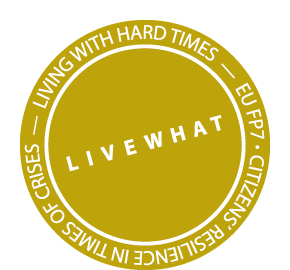Dissemination Activities
LIVEWHAT builds on an integrated and interactive three-tier dissemination strategy involving policy, scientific, and public dissemination.
 Policy Dissemination (see Workpackage 7)
Policy Dissemination (see Workpackage 7)
LIVEWHAT particularly targets policy-makers, practitioners and civil society organizations both at national and European levels.
Our main policy dissemination tools in this respect are:
- A Handbook of Good Practices that will be compiled near project completion. It will include an inventory of good and socially innovative practices, a description of the experiences and evaluations made by policy-makers and practitioners in the interactive discussion groups, and a scientific assessment based on the research findings.
- Five policy briefs presenting main project findings on: policy responses (WP2), collective responses to crises in the public domain (WP3), individual responses to crises and causal relationships between crises and their consequences on citizens (WP4 and WP5), and alternative forms of resilience to crises (WP6). In addition, we will issue a fifth policy brief summarizing the main policy-relevant findings and providing policy recommendations. The handbook of good practices and the policy briefs will be translated into the languages of the national teams.
- A series of interactive discussion groups with stakeholders in each country studied by the project. Participants will be asked to discuss research findings and recommendations in the light of their practical experiences and expertise. The policy briefs will provide important input into these deliberations.
- A final conference devoted primarily to disseminating the policy-relevant findings of the project.
 Scientific Dissemination (see Workpackage-9)
Scientific Dissemination (see Workpackage-9)
LIVEWHAT will generate a number of research findings and scientific outputs which will be actively disseminated amongst scientists and researchers.
Our main scientific dissemination tools in this respect are:
- Research papers and articles: On the basis of empirical findings, national research teamswill draft papers on individual countries and/or comparative analyses that will be presented at national and international conferences and workshops. They will also write articles to be published in scholarly journals or collective volumes.
- Summer School: We will organize a summer school for Ph.D. students on the topic of our research, where members of the national teams will teach and present project findings along with other invited experts in the field. The summer school will be hosted in the premises of the Italian partner i.e. the European University Institute.
- Research seminars at BA and MA-levels in the fields relating to the topic of the project: National teams will integrate LIVEWHAT findings into their existing teaching curricula by conducting research seminars.
- A collective book built on LIVEWHAT findings that will be submitted for publication upon project completion.
- An international scientific conference in which LIVEWHAT findings will be presented and discussed amongst leading scholars at national and European levels.
- Presentation of findings at conferences organized by national and international professional associations.
Consortium partners commit themselves to use LIVEWHAT’s findings for training and education purposes as today’s students and young scholars are the policy-makers, practitioners, and scientists of tomorrow!
 Public Dissemination (see Workpackage-8)
Public Dissemination (see Workpackage-8)
LIVEWHAT’s priority is that research findings are communicated in a concise and easy to read manner to the general public.
Our main public dissemination tools in this respect are:
- A documentary video on “citizens and the crisis.” The documentary will be produced to raise public awareness about the impact of economic crises on citizens’ lives and citizens’ responses to mitigate adverse effects.
- A Wikisite that will be set up with a view to offering information on alternative forms of resilience based on the findings of the sixth research activity. In addition to being an important means of public dissemination, the Wikisite will enhance networking of the individuals and groups engaged in alternative forms of actions, contributing to the promotion of good practice within Europe and beyond.
- Project newsletters getting published on a six-month basis and becoming available via the project website. The newsletters will be presenting LIVEWHAT activities and findings and be translated into the national languages of the Consortium partners.
Broad media coverage: If you are a journalist, blogger or opinion-maker this is for you! For more information about our media actions, please contact us.
